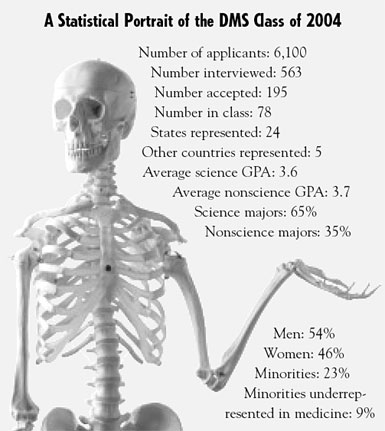First-year students bring a panoply of experiences to DMS
How to tell the story of your life and introduce yourself to new classmates and teachers? This was the challenge incoming Dartmouth medical students faced over the summer, as they composed brief autobiographies that would be mailed to their fellow first-years before the class's arrival on campus.
Beginning: "Begin at the beginning," the King of Hearts advised the White Rabbit, and nearly all of the DMS '04s heeded this injunction by opening their story with some form of "I grew up in . . ." Of course, this formulation resulted in both more and less exotic outcomes. In their own words:
"So far, I have had the opportunity to live and grow up in three very different countries— Sri Lanka, Oman in the Middle East, and the United States of America." (Mahesh De Silva)
"I come from a small, rural town in Ohio where cows, pigs, and sheep altogether outnumber the humans 10:1. Thankfully, pigs and cows are notoriously incapable of getting along, and their disunity keeps the humans in firm control of the city." (Bryan Coffing)
"My twin brother and I were born at Mary Hitchcock Hospital and spent several weeks in the NICU following our birth." (Bethany Lovejoy)
After establishing their origins, the autobiographers negotiated the essence of their achievements and activities— and that was a tall order for all of them. It should be no surprise that a class of 78 drawn from more than 6,000 applicants is academically accomplished. Andrew Welch, director of admissions, summarized those accomplishments in an address during orientation: "The class has average undergraduate grade point averages in the sciences of 3.6 and in the nonsciences of 3.7. Those are the highest average GPAs in the institution's history. You also have the highest average MCAT scores.
"Biology is the most popular major in the class," Welch continued, "but approximately onethird of you are nonscience majors, and there are as many history majors in the class as chemistry majors." The class came from almost 50 different colleges. It is 46% female and 54% male, and 23% are minorities, while 9% are members of racial or ethnic groups underrepresented in medicine.
Work: The class members also described a variety of work experiences, many of them related to medicine:
"I've been living in Boston with friends and working in a transplant surgery lab doing research." (Jamie Ames)
"In November 1993, I was drafted into the Israeli Defense Forces. I served in Military Intelligence and was a squad commander in an elite reconnaissance unit. I was also a combat medic." (Adam Bier)
"Living in the Andean highlands as a [Peace Corps] volunteer, I worked with indigenous farmers on agroforestry projects and taught environmental education and English in the schools." (Wendy Osterling)
"After college, I moved to New York City, where I danced with a small modern dance company, performed in an off-off- Broadway play, and sang with an a cappella group and a band." (Julia Hermann)
Spice: In addition, every life has a dash of spice beyond the formal activities, and this was evident in the biographies:
"In my free time, I enjoy cooking and singing in Hindi and Punjabi." (Amanjit Dhatt) "My most recent claim to fame is appearing for about half of a second as an audience member on Who Wants to Be a Millionaire." (Ali Goldkamp)
"As I write this I am watching my 10-day-old son, Tyler." (Jason Kemp)
"My first name, Ndidiamaka, means 'patience is beautiful,' while my last name, Onwubalili, means 'death is a tragedy.'" (Ndidiamaka Onwubalili)
"Every morning I dodge cow patties as I ride my granny bike across public grazing land, then through the gothic grandeur of Cambridge on my way to work." (Emily Wood)
Welch also quoted 19th-century DMS student William Tully's initial impression of his classmates: "'Such a motley collection, I am sure I never set my eyes on before. Some seem to be so awkwardly put together that, at first view, one would almost suppose that chance was the agent in their formation.'

|
"The Class of 2004 is not a motley collection," Welch continued. "In fact, all of us on the admissions committee can personally vouch for the fact that each member of the class owns a well-pressed, dark-blue suit. Yet we hope that a lack of uniformity —in background, in outlook, in biases and assumptions about the way the world operates—is still a defining feature of the student body."
Ph.D.'s: Another defining feature of the DMS student body is that it encompasses several groups of students beyond those in the M.D. program. Also new to the Medical School this year are 34 first-year doctoral candidates in the biomedical sciences —including 24 in the biochemistry program, six in pharmacology and toxicology, and four in physiology.
In addition, three M.D.- Ph.D. students are beginning their graduate studies, one each in physiology, molecular and cellular biology, and the psychological and brain sciences.
CECS: The Center for the Evaluative Clinical Sciences (CECS) also welcomed a new crop of students this fall—48 of them, all enrolled in the master's degree program. That brings total enrollment in the master's program to 74. There are also 14 students already pursuing a Ph.D. in the evaluative clinical sciences. CECS students range from recent college graduates to experienced physicians. In fact, 35% of the CECS students are doctors, and another 19% hold other advanced degrees.
The King of Hearts finished his admonition by saying, "Go on till you come to the end: then stop." Yet all these new students recognize that their story isn't over yet, that the next few years are just a beginning.
Jonathan Weisberg
If you would like to offer any feedback about this article, we would welcome getting your comments at DartMed@Dartmouth.edu.
